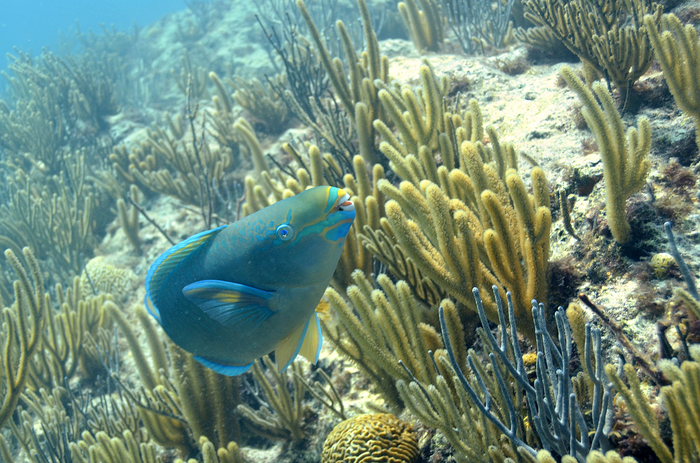A new study published in the journal Frontiers in Marine Science has uncovered some unexpected trends in the relationship between coral reefs and their environment, contrary to prevailing scientific expectations and understanding. Authors Eric Hochberg, a reef systems ecologist at the Bermuda Institute of Ocean Sciences (BIOS), and Michelle Gierach, a scientist at NASA’s Jet Propulsion Laboratory (JPL), used readily-available public data for coral cover to conduct a meta-analysis that quantitatively related reef condition to a suite of biogeophysical forcing parameters, such as aragonite saturation state, significant wave height, number of coral species, and a suite of local threats, among others.

Credit: Stacy Peltier
A new study published in the journal Frontiers in Marine Science has uncovered some unexpected trends in the relationship between coral reefs and their environment, contrary to prevailing scientific expectations and understanding. Authors Eric Hochberg, a reef systems ecologist at the Bermuda Institute of Ocean Sciences (BIOS), and Michelle Gierach, a scientist at NASA’s Jet Propulsion Laboratory (JPL), used readily-available public data for coral cover to conduct a meta-analysis that quantitatively related reef condition to a suite of biogeophysical forcing parameters, such as aragonite saturation state, significant wave height, number of coral species, and a suite of local threats, among others.
While observed trends were as expected with respect to some of the forcings, such as the 10-year trend for bleaching alert areas (or BAA, a measurement used by NOAA’s Coral Reef Watch to identify potentially harmful heat stress levels), the number of significant wave height events, local marine pollution threat, and number of coral species, the remaining correlations did not exhibit the expected trends.
All but one of the local threats (marine pollution)—including coastal development, overfishing, and sedimentation—have trends counter to prevailing scientific thought. That is, as the threats increase, there is not a concomitant decrease in coral cover. Likewise, the 10-year average BAA and aragonite saturation state (used to describe the ability of corals to calcify) show individual trends, or lack thereof, that are counter to what would be expected in our current understanding. Perhaps most surprisingly, coral cover is poorly predicted by all of the biogeophysical forcings, both individually and collectively.
The authors conclude that, while the size of the data set is an issue, the results highlight the “problem of using a sparse, disparate data set to synthesize a global model of reefs. “Available data utilized in this study are not sufficient to quantitatively relate ecosystem-scale coral reef condition to the surrounding environment,” Hochberg said.
The solution to this problem lies in remote sensing approaches, which can offer uniform, high-density data sets at the ecosystem scale across reef regions. However, in order to successfully measure reef condition at the ecosystem scale, the underlying data need to spectrally discriminate between the fundamental reef benthic types (i.e., live coral from algae). Several satellite missions are under development that may meet these requirements, such as the NASA Surface Biology and Geology (SBG) mission).
Airborne remote sensing offers another viable alternative, one example being the NASA Earth Venture Suborbital-2 (EVS-2) COral Reef Airborne Laboratory (CORAL) mission (https://coral.jpl.nasa.gov/, https://coral.bios.edu). During 2016-17 CORAL used the NASA JPL Portable Remote Imaging SpectroMeter (PRISM) to map benthic cover for ~1% of the global reef area. With these data, CORAL scientists quantified benthic cover and modeled primary production and calcification at the reef scale. Results are forthcoming after final data and analysis quality assurances.
###
About Bermuda Institute of Ocean Sciences
The Bermuda Institute of Ocean Sciences (BIOS) is an independent U.S. non-profit scientific research and educational organization based in Bermuda and a Bermuda Registered Charity #116. For over 100 years BIOS-based researchers and visiting scientists have worked to explore the ocean and address important local and global environmental issues. Ocean and atmospheric science research programs at BIOS provide a wealth of information that is used by government representatives, environmental resource managers, and community leaders to inform their decision-making processes. The R/V Atlantic Explorer is a U.S. flagged UNOLS ocean class vessel, operated by BIOS, that provides scientists with a platform for conducting short-and long-term studies of the open ocean, providing data to inform our understanding of global climate change, nutrient cycling, and ocean-atmospheric dynamics. For more information visit www.bios.edu
Journal
Frontiers in Marine Science
DOI
10.3389/fmars.2021.727038
Method of Research
Meta-analysis
Subject of Research
Not applicable
Article Title
Missing the Reef for the Corals: Unexpected Trends Between Coral Reef Condition and the Environment at the Ecosystem Scale
Article Publication Date
27-Aug-2021




